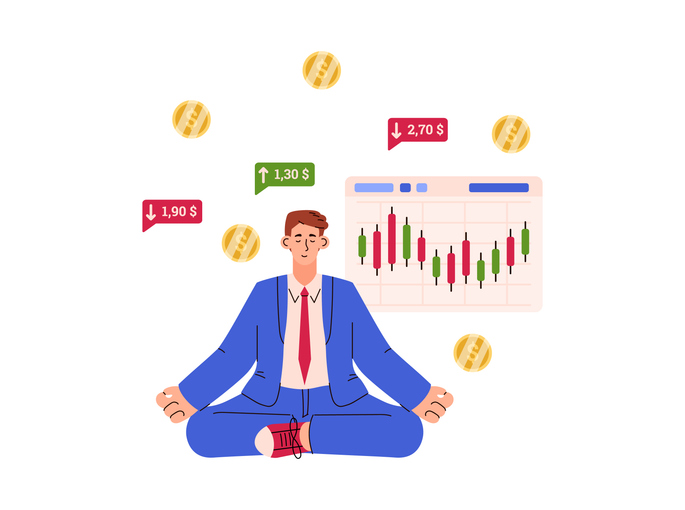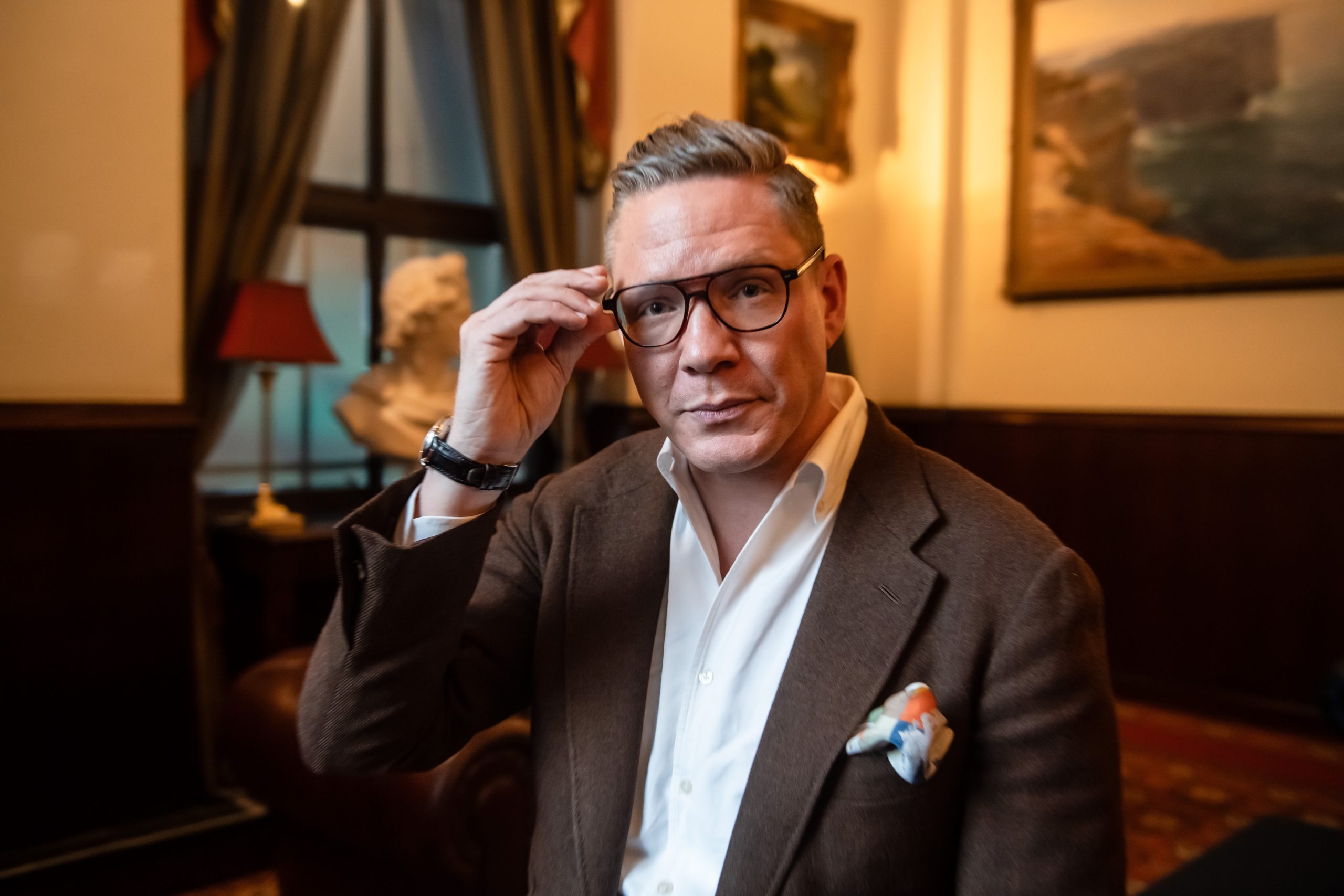How Your Personality Can Affect Your Portfolio
Neuroticism and openness, in particular, are closely linked to investors’ willingness to buy stocks
Can certain personality traits explain investors’ risk tolerance and investment decisions?
A forthcoming paper suggests it might. Specifically, the authors found that two personality traits—neuroticism and openness—significantly affect how investors perceive the economy, financial markets and their likelihood to buy stocks or stock funds, with those who are less neurotic and more open tending to have a higher allocation to equities.
While the authors primarily studied investors in the U.S., they also identified similar patterns among investors in Germany, Australia and China.
The Wall Street Journal spoke with two of the paper’s co-authors, Hongjun Yan, a professor of finance at DePaul University’s Driehaus College of Business, and Cameron Peng, an assistant professor of finance at the London School of Economics, about their findings. Zhengyang Jiang, an associate professor of finance at Northwestern University’s Kellogg School of Management, is the paper’s other co-author.
Here are edited excerpts of the conversation.
WSJ: How can psychology theories help to explain investor behaviour?
YAN: Investors often have very different portfolios. Traditionally, economists focus on risk aversion and market expectations, but in this paper we argue that well-known personality traits—extroversion, agreeableness, openness, conscientiousness and neuroticism—provide a new dimension to explain investors’ choices.
In the Winnie-the-Pooh stories, Tigger is always excited and optimistic while Eeyore is always down and pessimistic. You might expect their investment portfolios to look very different and reflect their overall outlook.
WSJ:How did you study this topic?
PENG: We collaborated with the American Association of Individual Investors, administering a survey to over 3,000 of its members. We collected information on their personality traits, market expectations, and investment decisions. The AAII sample is predominantly wealthy, white, older men. And when they make investment decisions, they are usually quite big, involving hundreds of thousands or even millions of dollars. Their actions can have a real impact on the market.
WSJ:What did you find?
YAN: We found that neuroticism and openness are correlated with investors’ beliefs about the market and their likelihood to buy equities. We were surprised that agreeableness wasn’t important when it comes to investment beliefs or decisions since other researchers have found that agreeableness tends to be correlated with other economic outcomes, like success in negotiating wages.
WSJ: How does neuroticism affect investors’ decisions?
YAN: Someone who is more neurotic has a very different outlook than someone who is not in terms of stock-market expectation. For example, an investor ranking in the middle of the [neurotic] scale might expect an annual stock-market premium of about 6%. But investors at the top of the scale are likely to only expect a 4% stock-market premium, while investors at the bottom of the neuroticism scale are likely to expect an 8% stock-market premium.
PENG: Neuroticism also affected how respondents invested their money in their actual accounts. More neurotic investors were less likely to own equities. Very neurotic investors invested about 56% of their portfolio in equities, while investors who weren’t neurotic invested about 64% of their portfolio in equities.
WSJ:How does openness affect investors’ decisions?
PENG: Investors ranking high for openness were more likely to entertain the possibility of extreme events, like a market crash or a run—really any scenario when the market goes up or down by more than 20%.
Investors who were very open were somewhat more likely to take risks by buying equities. Specifically, investors who were the most open were 3 percentage points more likely to own more equities than investors who weren’t. They had about 62% of their portfolio in equities, while investors who were less open had about 59% of their portfolio in equities.
WSJ: What did you find when you looked at data from other countries?
YAN: We find that neuroticism and openness affect market perceptions and decisions fairly consistently across different data sets. That’s quite remarkable considering the culture and investing environment in each country is very different.
WSJ:What are the study’s implications?
YAN: Personality traits may shape investors’ decisions in ways that many economists have yet to seriously consider. Our research, for instance, also suggests more extroverted and more neurotic investors’ investment choices could be highly influenced by social interactions, or what their friends or colleagues are doing. That insight goes beyond economists’ traditional framework, which focuses on risk tolerance and market expectations, and could help researchers better explain investor behaviour.
PENG: Large asset-management firms or financial planners could spend time getting to know their clients’ personalities and use those insights when they make investment recommendations. Maybe they could encourage investors who tend to be neurotic to be a little less pessimistic.
 Copyright 2020, Dow Jones & Company, Inc. All Rights Reserved Worldwide. LEARN MORE
Copyright 2020, Dow Jones & Company, Inc. All Rights Reserved Worldwide. LEARN MORE
A divide has opened in the tech job market between those with artificial-intelligence skills and everyone else.
A 30-metre masterpiece unveiled in Monaco brings Lamborghini’s supercar drama to the high seas, powered by 7,600 horsepower and unmistakable Italian design.
A divide has opened in the tech job market between those with artificial-intelligence skills and everyone else.
There has rarely, if ever, been so much tech talent available in the job market. Yet many tech companies say good help is hard to find.
What gives?
U.S. colleges more than doubled the number of computer-science degrees awarded from 2013 to 2022, according to federal data. Then came round after round of layoffs at Google, Meta, Amazon, and others.
The Bureau of Labor Statistics predicts businesses will employ 6% fewer computer programmers in 2034 than they did last year.
All of this should, in theory, mean there is an ample supply of eager, capable engineers ready for hire.
But in their feverish pursuit of artificial-intelligence supremacy, employers say there aren’t enough people with the most in-demand skills. The few perceived as AI savants can command multimillion-dollar pay packages. On a second tier of AI savvy, workers can rake in close to $1 million a year .
Landing a job is tough for most everyone else.
Frustrated job seekers contend businesses could expand the AI talent pipeline with a little imagination. The argument is companies should accept that relatively few people have AI-specific experience because the technology is so new. They ought to focus on identifying candidates with transferable skills and let those people learn on the job.
Often, though, companies seem to hold out for dream candidates with deep backgrounds in machine learning. Many AI-related roles go unfilled for weeks or months—or get taken off job boards only to be reposted soon after.
Playing a different game
It is difficult to define what makes an AI all-star, but I’m sorry to report that it’s probably not whatever you’re doing.
Maybe you’re learning how to work more efficiently with the aid of ChatGPT and its robotic brethren. Perhaps you’re taking one of those innumerable AI certificate courses.
You might as well be playing pickup basketball at your local YMCA in hopes of being signed by the Los Angeles Lakers. The AI minds that companies truly covet are almost as rare as professional athletes.
“We’re talking about hundreds of people in the world, at the most,” says Cristóbal Valenzuela, chief executive of Runway, which makes AI image and video tools.
He describes it like this: Picture an AI model as a machine with 1,000 dials. The goal is to train the machine to detect patterns and predict outcomes. To do this, you have to feed it reams of data and know which dials to adjust—and by how much.
The universe of people with the right touch is confined to those with uncanny intuition, genius-level smarts or the foresight (possibly luck) to go into AI many years ago, before it was all the rage.
As a venture-backed startup with about 120 employees, Runway doesn’t necessarily vie with Silicon Valley giants for the AI job market’s version of LeBron James. But when I spoke with Valenzuela recently, his company was advertising base salaries of up to $440,000 for an engineering manager and $490,000 for a director of machine learning.
A job listing like one of these might attract 2,000 applicants in a week, Valenzuela says, and there is a decent chance he won’t pick any of them. A lot of people who claim to be AI literate merely produce “workslop”—generic, low-quality material. He spends a lot of time reading academic journals and browsing GitHub portfolios, and recruiting people whose work impresses him.
In addition to an uncommon skill set, companies trying to win in the hypercompetitive AI arena are scouting for commitment bordering on fanaticism .
Daniel Park is seeking three new members for his nine-person startup. He says he will wait a year or longer if that’s what it takes to fill roles with advertised base salaries of up to $500,000.
He’s looking for “prodigies” willing to work seven days a week. Much of the team lives together in a six-bedroom house in San Francisco.
If this sounds like a lonely existence, Park’s team members may be able to solve their own problem. His company, Pickle, aims to develop personalised AI companions akin to Tony Stark’s Jarvis in “Iron Man.”
Overlooked
James Strawn wasn’t an AI early adopter, and the father of two teenagers doesn’t want to sacrifice his personal life for a job. He is beginning to wonder whether there is still a place for people like him in the tech sector.
He was laid off over the summer after 25 years at Adobe , where he was a senior software quality-assurance engineer. Strawn, 55, started as a contractor and recalls his hiring as a leap of faith by the company.
He had been an artist and graphic designer. The managers who interviewed him figured he could use that background to help make Illustrator and other Adobe software more user-friendly.
Looking for work now, he doesn’t see the same willingness by companies to take a chance on someone whose résumé isn’t a perfect match to the job description. He’s had one interview since his layoff.
“I always thought my years of experience at a high-profile company would at least be enough to get me interviews where I could explain how I could contribute,” says Strawn, who is taking foundational AI courses. “It’s just not like that.”
The trouble for people starting out in AI—whether recent grads or job switchers like Strawn—is that companies see them as a dime a dozen.
“There’s this AI arms race, and the fact of the matter is entry-level people aren’t going to help you win it,” says Matt Massucci, CEO of the tech recruiting firm Hirewell. “There’s this concept of the 10x engineer—the one engineer who can do the work of 10. That’s what companies are really leaning into and paying for.”
He adds that companies can automate some low-level engineering tasks, which frees up more money to throw at high-end talent.
It’s a dynamic that creates a few handsomely paid haves and a lot more have-nots.
A cluster of century-old warehouses beneath the Harbour Bridge has been transformed into a modern workplace hub, now home to more than 100 businesses.
ABC Bullion has launched a pioneering investment product that allows Australians to draw regular cashflow from their precious metal holdings.























